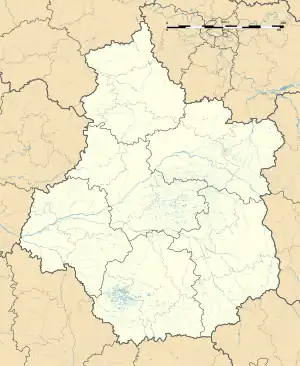Sarzay | |
|---|---|
.JPG.webp) The church of Saint-Pierre, in Sarzay | |
Location of Sarzay | |
 Sarzay  Sarzay | |
| Coordinates: 46°36′09″N 1°54′19″E / 46.6025°N 1.9053°E | |
| Country | France |
| Region | Centre-Val de Loire |
| Department | Indre |
| Arrondissement | La Châtre |
| Canton | Neuvy-Saint-Sépulchre |
| Government | |
| • Mayor (2020–2026) | Chantale Bigrat[1] |
| Area 1 | 18.3 km2 (7.1 sq mi) |
| Population | 298 |
| • Density | 16/km2 (42/sq mi) |
| Time zone | UTC+01:00 (CET) |
| • Summer (DST) | UTC+02:00 (CEST) |
| INSEE/Postal code | 36210 /36230 |
| Elevation | 183–256 m (600–840 ft) (avg. 220 m or 720 ft) |
| 1 French Land Register data, which excludes lakes, ponds, glaciers > 1 km2 (0.386 sq mi or 247 acres) and river estuaries. | |
Sarzay (French pronunciation: [saʁzɛ]) is a commune in the Indre department in central France.
History
First mentioned in written records in 1300, Sarzay was a parish of the Archbishop of Bourges. The seigneurie of Sarzay belonged to the Barbançois family, who constructed the castle of Sarzay, and they remained the possessor of the fief until 1720. The fief was transformed into a marquisat in 1651. The castle was the setting for a novel by George Sand, le Meunier d'Angibault.
Population
| Year | Pop. | ±% p.a. |
|---|---|---|
| 1968 | 379 | — |
| 1975 | 343 | −1.42% |
| 1982 | 320 | −0.99% |
| 1990 | 319 | −0.04% |
| 1999 | 319 | +0.00% |
| 2009 | 320 | +0.03% |
| 2014 | 323 | +0.19% |
| 2020 | 299 | −1.28% |
| Source: INSEE[3] | ||
See also
References
- ↑ "Répertoire national des élus: les maires". data.gouv.fr, Plateforme ouverte des données publiques françaises (in French). 9 August 2021.
- ↑ "Populations légales 2021". The National Institute of Statistics and Economic Studies. 28 December 2023.
- ↑ Population en historique depuis 1968, INSEE
Wikimedia Commons has media related to Sarzay.
This article is issued from Wikipedia. The text is licensed under Creative Commons - Attribution - Sharealike. Additional terms may apply for the media files.